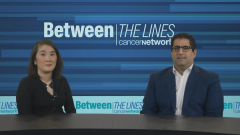
Treatment Options for Patients with EGFR Exon 20–Mutated NSCLC
Experts on non–small cell lung cancer discuss treatment options for patients with EGFR exon 20 mutations in the first line and beyond.
Episodes in this series

Transcript:
Joshua K. Sabari, MD: When you meet a new patient with an EGFR exon 20 insertion mutation, so newly diagnosed with metastatic disease, how are you thinking about treatment in the frontline setting?
Helena A. Yu, MD: Great question. If possible, I like to hold treatment and wait for those molecular results to come back. I think most people are stable enough to wait 2 weeks to get those results. I’m getting those results before we discuss treatment. For EGFR exon 20, in the absence of a clinical trial they can participate in, I am doing platinum-based chemotherapy as first-line treatment and then using agents like amivantamab in the second-line setting.
Joshua K. Sabari, MD: My practice is very similar to that. What about the utilization of immunotherapy? It’s very controversial in the frontline setting. Why are you not using immunotherapy in the frontline setting in your patients with EGFR exon 20 insertion mutations?
Helena A. Yu, MD: I think it’s a nuanced point, and it can be confusing, especially for providers who don’t see these patients very often. KEYNOTE-189 is a large study that looked at platinum-based chemotherapy plus pembrolizumab, and that explicitly excluded all patients with EGFR mutations, including exon 20. I think we just don’t have the data.
There are some emerging data looking at sensitizing EGFR mutations and chemotherapy plus immunotherapy, the KEYNOTE-789 study and the CheckMate study. Those don’t look like immunotherapy is additive for that sort of population. I would definitely extrapolate that to exon 20 in saying we don’t have any data to say adding immunotherapy to chemotherapy is helpful, and then there’s also that potential harm in terms of heightening immune-related toxicities.
Joshua K. Sabari, MD: I would agree. In my practice, I leave immunotherapy of in the frontline setting, waiting to see some of the data you mentioned. What about osimertinib in the frontline setting? You do see a lot of people use that in clinical practices. Maybe talk about 80 mg of osimertinib in the frontline setting and then transition to 160 mg. What are your thoughts there? What are the data?
Helena A. Yu, MD: I suspect that that might be a bit of combining and saying 1 size fits all in terms of EGFR mutations and treating some of these exon 20s with osimertinib. There are very few data for osimertinib at 80 mg, but there is almost a 0% response rate for EGFR exon 20s. There was a small ECOG [Eastern Cooperative Oncology Group] study that looked at osimertinib at 160 mg that did show modest results, a response rate in the 20% to 25% range. I think it’s not an option I would select first because we have agents like amivantamab that are more effective.
Joshua K. Sabari, MD: I agree. I would never use osimertinib in the frontline setting for a patient with an EGFR exon 20 insertion mutation. We know that therapy is not an effective strategy. Maybe tell us a little about the biology. Why doesn’t osimertinib work for patients with EGFR exon 20?
Helena A. Yu, MD: I think it has to do with the protein structure of EGFR and the area where drugs bind to EGFR when there’s an exon 20 mutation vs an exon 19 deletion or an L858R where there isn’t as good binding, leading to ineffective cancer treatment.
Joshua K. Sabari, MD: I agree. I think the response rate for osimertinib at 80 mg is about 0%. We know in later lines for osimertinib 160 mg, there is a response rate in the low 20% range. We’ll talk about what you do in the second-line setting in a moment. But before we do, let’s introduce what you do in your clinical practice with patients who progress, unfortunately, on chemotherapy. We know that median progression-free survival in the frontline setting on chemotherapy platinum doublet is about 7 months. So, when your patient progresses on chemotherapy in the front line, what are you utilizing in the second-line setting in your practice?
Helena A. Yu, MD: I would say one thing to add, Josh, is that I think for patients with EGFR exon 20, there are hints that they might even do less well with chemotherapy, and so progression is an inevitable thing. Because we do the NGS [next-generation sequencing] before starting treatment, I have that mutation result in my back pocket. So when I do see progression, I would move to the approved EGFR exon 20 drugs like amivantamab.
Joshua K. Sabari, MD: You bring up a great point. We talked about patients with EGFR exon 19 and 21, and now we’re talking about EGFR exon 20, a less common EGFR mutation. How do those patients do? Compare them with your clinical therapies that are available at this time.
Helena A. Yu, MD: Historically, the data in terms of survival for EGFR exon 20 was shorter than for exon 19 deletion and L858R. I think that is in part because up until recently, we didn’t have targeted therapies for that population, so their armamentarium of treatments was quite limited. I still think the data we have retrospectively show they don’t respond as well to chemotherapy, they’re very likely to get brain metastases. So it’s a population where we want to stay on top of treatment and make sure we give our best treatments as soon as possible.
Joshua K. Sabari, MD: I couldn’t agree more.
Transcript edited for clarity.
Newsletter
Stay up to date on recent advances in the multidisciplinary approach to cancer.






































